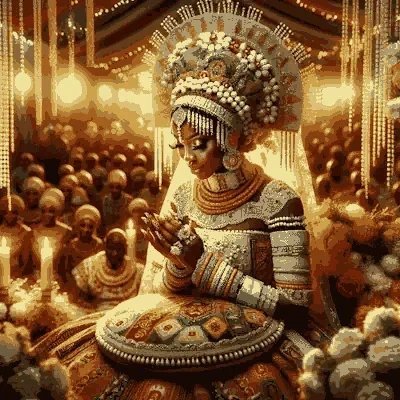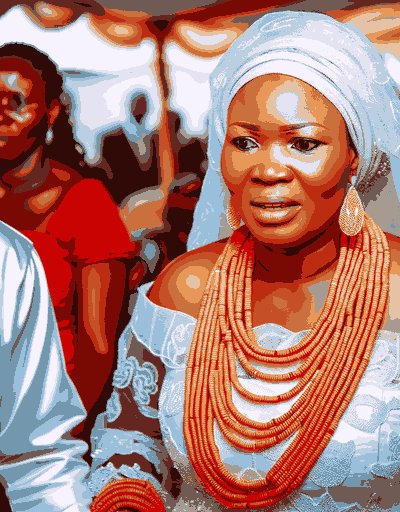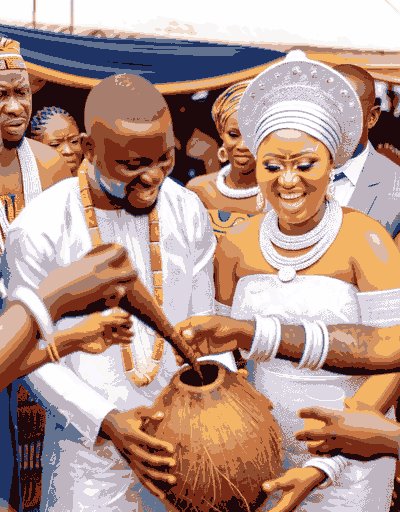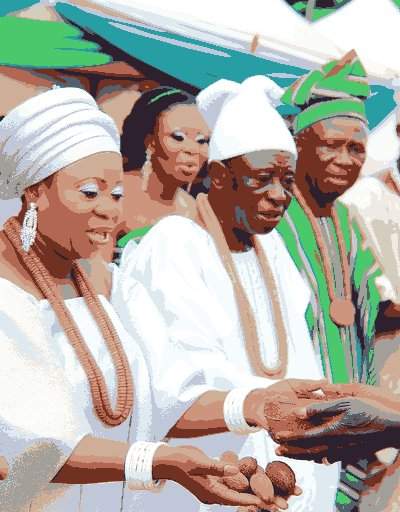Benin Wedding Traditions Cultural Wedding Guide 2025
Picture this: drums echoing through the night air, coral beads gleaming in candlelight, and hundreds of voices raised in celebration. This is the magic of a Benin wedding-where ancient customs meet modern love stories in spectacular multi-day celebrations that bring entire communities together.

The Beautiful Complexity of Benin Marriages

In Benin, weddings aren’t just about two people falling in love. They’re about two families becoming one, two histories intertwining, and traditions passed down through countless generations coming alive once more. Whether you’re planning your own Benin wedding or simply curious about these rich customs, you’re about to discover celebrations that typically gather 100-300 guests for 2-5 days of rituals, feasting, and pure joy.
The investment? Families typically spend between $2,000-$10,000 USD (roughly 1.2-6 million CFA francs), but what they receive in return-the blessing of ancestors, the strengthening of community bonds, and memories to last lifetimes-proves priceless.
Your Complete Wedding Timeline: From First Meeting to Forever

Ever wondered how long it takes to plan a traditional Benin wedding? The journey begins long before anyone says “I do”:
The Year-Long Dance of Courtship:
- 12-18 months out: Those first nervous family meetings begin, with elders sizing up potential matches
- 6-12 months out: Time for “Mo mi i mo emoh mee ee moh eh”-literally “know me and let me know you”
- 3-6 months out: Serious negotiations start, lists get longer, excitement builds
- 1-3 months out: Family dinners multiply as both sides grow closer
- Wedding week: The crescendo-ceremonies, celebrations, and controlled chaos
- After the vows: A bride’s bittersweet journey to her new home
When Families First Meet: The Art of Introduction

The Dance of Betrothal
Imagine your future in-laws arriving at your family home, arms laden with palm wine, kola nuts, and coconuts. This isn’t just a social call-it’s the beginning of betrothal traditions that have bound Benin families together for centuries. Among the Edo people, these initial gifts (worth $50-200 USD) speak louder than any words could.
What makes these ceremonies special? It’s the deliberate slowness. In our instant-message world, Benin betrothals unfold over 6-12 months of careful relationship building. Those 10-20 liters of palm wine aren’t just drinks-they’re liquid promises. The 50-100 kola nuts represent bitter and sweet times ahead. And those 20-30 coconuts? They symbolize the refreshment found in unity.
“Mo Mi I Mo E”: The Moment of Truth
The introduction ceremony transforms nervous anticipation into celebration. Picture 20-50 family members gathering, the air thick with expectation. This is Mo mi i mo emoh mee ee moh eh-that heart-stopping moment when a bride publicly identifies and accepts her suitor from among the crowd.
For 3-5 hours, families who were strangers become relations. The cost ($300-800 USD) covers more than just refreshments-it funds the beginning of a lifelong alliance. And those regional variations add unique flavors:
- In Edo communities, elders offer blessings while sharing palm wine
- Yoruba families emphasize formal prostrations and elaborate greetings
- Muslim gatherings incorporate Quranic readings between courses
- Coastal families pour libations, inviting ancestors to witness the joy
Love Through Labor: Proving Your Worth
Here’s something that might surprise you: historically, Benin grooms worked their future in-laws’ farms 2-3 days every month. Imagine showing up not with flowers, but with farming tools! This 500-year-old tradition tested more than muscle-it revealed character, dedication, and the ability to provide.
Today’s suitors have adapted. Instead of tilling fields, they might send $100-300 USD monthly support or beautiful fabric every quarter. The message remains unchanged: “I’m invested in this family’s wellbeing, not just their daughter.”
Breaking Bread, Building Bonds
As wedding day approaches, family dinners multiply. These aren’t your average potlucks-they’re carefully orchestrated gatherings where future in-laws discover shared values over shared meals. Each dinner (costing $150-400 USD) weaves the families tighter together, turning formal acquaintances into genuine relatives.
The Sacred Heart of Marriage Ceremonies
Inside the Ogua: Where Two Become One
Step inside the Oguaoh-GWAH-the sacred family gathering place where traditional marriages truly begin. Only 20-30 of the closest family members witness these 2-4 hour ceremonies, making them intensely personal despite their grand significance.
The atmosphere inside? Electric with ancestral presence. Elders speak prayers that have echoed through generations. Kola nuts get broken and shared-their bitter taste reminding everyone that marriage includes challenges alongside sweetness. Palm wine flows, binding the families in shared celebration. The $500-2,000 USD spent on ritual items and officiants seems modest compared to the spiritual weight of these moments.
The Bride Price: More Than Money Can Measure
Let’s address what often gets misunderstood: the bride price isn’t buying a person-it’s honoring a family. That symbolic 25-100 Naira might seem insignificant, but it carries thousand-year-old significance. Combined with gifts totaling $500-3,000 USD, it demonstrates respect, financial stability, and commitment to supporting not just a wife, but her entire lineage.
What goes into a modern bride price?
- The symbolic amount: Those traditional Naira that ancestors would recognize
- Real support: $300-1,500 USD showing you can provide
- Fabric gifts: 12-24 yards of cloth for family members to share the joy
- Gleaming jewelry: Gold or coral beads worth $200-800 USD
- Celebration supplies: Fine drinks and foods to mark the occasion
Youth Recognition: The Iyomo and Ibiegua
Here’s where Benin traditions show their community spirit: the groom must financially acknowledge the bride’s younger siblings and household youth. Through Iyomoee-YOH-moh and Ibieguaee-bee-EH-gwah settlements, 15-40 young people receive $5-50 USD each-a reminder that marriage affects entire households, not just the couple.
Watch the joy on young faces as they receive their portions. For many, it’s their first formal recognition as community members. The total cost ($200-1,000 USD) buys more than goodwill-it invests in the next generation’s blessing.
The Great Reveal: Finding Your Bride
Suddenly, the mood shifts from solemn to playful. Seven veiled figures enter-but which is the bride? The audience erupts in commentary as each woman presents herself. “Not that one!” they shout, laughing as decoys are revealed. This 15-30 minute tradition builds anticipation while celebrating the bride’s uniqueness among her peers.
When the real bride finally appears in her $300-1,500 USD traditional attire, coral beads catching the light, her elaborate Okukuoh-KOO-koo hairstyle towering majestically, the crowd’s roar confirms what everyone knows: she’s worth the wait.
Washing Away the Past, Welcoming the Future
In one of the ceremony’s most touching moments, an elderly female relative (always over 50, respected for her wisdom) performs the hand washing ritual. As water flows over the bride’s hands, 10-20 cowrie shells and coins clink softly-each one a wish for fertility and prosperity.
Those 10-15 minutes hold profound meaning. The bride enters as her parents’ daughter but rises as her husband’s wife, officially welcomed by his family’s matriarch. Later, she’ll dine alone, contemplating her transformation in solitary reflection.
Dressing for Destiny: Traditional Wedding Attire
The Bride’s Regal Transformation
Nothing quite prepares you for seeing a Benin bride in full traditional splendor. Those coral beads-5 to 15 strands worth $500-3,000 USD-aren’t just jewelry. They’re 800 years of Kingdom of Benin tradition wrapped around her neck, each bead a connection to queens of the past.
The Okukuoh-KOO-koo hairstyle alone takes 3-5 hours to create, rising like a crown of braided glory. Combined with embroidered wrapper sets, the total look costs $800-4,500 USD but creates priceless photographs and memories. Even with modern options available, 85% of brides still choose coral over contemporary jewelry-tradition wins.
Different ethnic groups add their unique touches:
- Edo brides glow in deep red wrappers with maximum coral
- Muslim brides elegantly combine modesty with beauty in three-piece sets
- Coastal brides splash vibrant pagnepahn-yeh patterns with cowrie shell accents
The Groom’s Noble Bearing
Benin grooms cut equally impressive figures. That white dashikidah-SHEE-kee suit or embroidered boubouboo-BOOcosting $200-1,200 USD transforms ordinary men into princes. Add a bowler hat or traditional headpiece, perhaps a decorated walking stick, and you have regality personified.
What’s remarkable? Despite Western influence, 90% of grooms choose traditional attire over tuxedos. They understand that on this day, they represent not just themselves but generations of men who married before them.
Fabrics That Tell Stories
The BombaBOHM-bah ceremonial fabrics deserve special mention. These aren’t off-the-rack outfits-skilled artisans spend 20-40 hours embroidering each garment. At $500-2,500 USD per complete outfit, they’re investments in wearable art that often become family heirlooms.
Reception Magic: When Private Becomes Public
The Grand Entrance
After intimate ceremonies conclude, prepare for spectacle. The couple, surrounded by their “elite squad” of 30-40 family witnesses, dances into the public arena. This transition from sacred to celebratory marks when the wider community joins the joy.
For the next 4-8 hours, 100-500 guests feast, dance, and shower the couple with gifts. Traditional bands-usually 2-4 different groups-take turns filling the air with rhythms that get even elderly aunties moving. The $1,000-5,000 USD reception cost covers not just food and music but the creation of community memories.
Dances That Speak Without Words
When the tékéTEH-keh begins at Muslim weddings, 20-30 dancers move as one, their synchronized steps telling stories of unity. Edo communities respond with Ogeneoh-GEH-neh dances, drums speaking a language older than words. Yoruba celebrations pulse with BataBAH-tah drum rhythms that reportedly summon joy from the very ground.
Professional dance groups earn their $200-800 USD fees, but family performers who receive $50-200 USD in appreciation often steal the show with their heartfelt movements. Each 30-45 minute performance adds another layer to the celebration’s rich tapestry.
Tasting Life Together
One of the most Instagram-worthy moments comes during the Yoruba “Tasting of Four Elements” ritual. Watch the couple’s faces as they taste:
- Lemon’s sourness-those inevitable disappointments they’ll face together
- Vinegar’s bitterness-the hard times that test every marriage
- Cayenne’s fire-passion that keeps love alive
- Honey’s sweetness-the joy that makes it all worthwhile
As 50-100 guests witness this 10-minute ceremony, many unconsciously hold their spouse’s hand tighter, remembering their own journey through all four flavors.
New Beginnings: Post-Wedding Transitions
A Bride’s Bittersweet Journey
Perhaps the most emotional moment comes after all the dancing stops. The bride, escorted by 10-20 young women but notably not her parents, begins her 1-3 hour journey to her husband’s family home. This tradition acknowledges a profound truth: she’s transitioning between worlds.
The procession stops 2-3 times for blessings, each pause allowing her to gather strength for the change ahead. Upon arrival, a 30-45 minute welcome ceremony and $50-200 USD in welcome gifts await-her new family’s way of saying “you belong here now.”
Modern Meets Traditional
Today’s Benin couples masterfully blend old and new. They might exchange rings in a church ceremony (35% now do) but still honor ancestors with traditional rites (95% compliance). They hire photographers to capture coral bead traditions for Instagram while livestreaming ceremonies to relatives abroad (40% of urban weddings).
This fusion creates unique celebrations. Brides might wear a white dress for photos, then change into traditional wrappers for rituals. Grooms sport tuxedos at receptions but don ancestral robes for blessings. The total investment ($3,000-10,000 USD) reflects this beautiful duality.
Fashion’s Evolution
Local designers report a 60% surge in requests for traditional-modern fusion wear since 2020. Couples want the best of both worlds: contemporary silhouettes crafted from ancestral fabrics, modern tailoring that honors traditional embroidery techniques.
Current trends show:
- Traditional textiles dominating (70% of choices)
- Coral beads remaining essential (85% of brides)
- Colors shifting between time-honored reds and contemporary pastels
- Designer pieces commanding premium prices ($500-3,000 USD per outfit)
Understanding Changes: When Marriages End
While we celebrate unions, honesty requires acknowledging that some marriages conclude. Traditional councils still handle 30% of rural divorces, applying customary law with communal wisdom. Urban couples increasingly use civil courts (70%), though many still seek elders’ counsel alongside legal proceedings.
Living Traditions: What Survives and Thrives
Recent surveys of 1,000 couples married between 2020-2024 reveal which traditions remain strongest:
Still Universal (90%+ practice rate):
- Family introduction ceremonies (98%)
- Bride price traditions (95%)
- Traditional wedding attire (90%)
Strongly Maintained (70-89%):
- Ceremonial dances (88%)
- Pre-wedding family dinners (85%)
- Hand washing rituals (75% in traditional communities)
- Bride revelation ceremonies (70%)
Evolving but Enduring (60-69%):
- Tasting of Four Elements (65% of Yoruba weddings)
- Traditional bride’s journey (60%)
These statistics tell a powerful story: core family-centered customs remain virtually unchanged while some ceremonial elements adapt to contemporary life. The heart of Benin wedding traditions-family, community, and cultural connection-beats as strongly today as it did centuries ago.
Your Benin Wedding Journey
Whether you’re planning your own Benin wedding or simply appreciating these rich traditions, remember that each ceremony carries the weight of history while celebrating fresh beginnings. In Benin, weddings remind us that love is never just between two people-it’s a force that binds families, honors ancestors, and strengthens entire communities.
From that first nervous introduction to the final dance at the reception, Benin weddings create magic from meaning. They prove that in our modern world, the oldest traditions often speak the deepest truths about love, commitment, and the joy of joining lives together.
Frequently Asked Questions
How much does a traditional Benin wedding really cost?
The answer might surprise you—and also depends entirely on your definition of "necessary." Basic traditional ceremonies run 1.2-3 million CFA francs ($2,000-$5,000 USD), covering essential rituals, modest receptions, and traditional attire. But here's the thing: Benin weddings are like smartphones—there's always a premium version. Elaborate celebrations can reach 6 million CFA francs ($10,000 USD) or more, especially when you factor in multiple ceremonies, designer Bomba(royal fabric) outfits, and feeding 500 "close" family members. Pro tip: Start saving early and remember that many families contribute collectively—your wedding is their investment in community standing too.
How long do traditional Beninese weddings last?
Traditional Beninese weddings typically span 2-5 days of ceremonies and celebrations, involving 100-300 guests.
Can you have a Benin wedding if you're not from Benin?
Great question! The short answer is yes, but with important caveats. Many Benin families welcome "outsiders" who genuinely respect the traditions, especially if you're marrying into a Benin family. However, this isn't cultural cosplay—these ceremonies carry deep spiritual significance. If you're the non-Benin partner, expect to participate in educational sessions with family elders, learn basic greetings in local languages, and demonstrate genuine commitment to understanding the customs. Some families even assign you a cultural mentor. The beautiful part? Once you've proven your sincerity, you're not just accepted—you're family, with all the blessings (and obligations) that entails.
What is the typical cost of a Beninese wedding?
Beninese weddings usually cost between $2,000-$10,000 USD, covering ceremonies, attire, and celebrations.
What happens if the bride picks the wrong person during the revelation ceremony?
This is everyone's secret fear, right? In reality, it's nearly impossible—the bride has usually helped coordinate who stands where! But tradition has safeguards: If she appears confused, female relatives can whisper hints. If she still picks wrong (it's happened exactly twice in living memory in one Porto-Novo community), everyone laughs it off as "testing the groom's patience." The ceremony pauses, more palm wine flows, and they try again. The real purpose isn't the mystery—it's the public declaration of choice. Though one grandmother insists the spirits sometimes confuse brides who aren't truly ready for marriage...
What is the Ogua ceremony in Benin weddings?
The Ogua is a sacred 2-4 hour ceremony where 20-30 family members witness ancestral blessings and traditional rituals.
Do modern couples still do the full 5-day celebration?
Many do, but with modern twists! Urban couples often compress ceremonies into long weekends, scheduling the Ogua(family sanctuary) ceremony Friday evening, church service Saturday morning, and traditional reception Saturday night. Some split ceremonies across months—traditional rites in the hometown, contemporary reception in the city. The key elements remain non-negotiable for about 90% of couples: family introductions, bride price negotiations, and at least one day of traditional celebration. Even the most "modern" couples find ways to honor core traditions—because explaining to your grandmother why you skipped the coral beads isn't worth the lifetime of guilt!
How much is the typical bride price in Benin?
The bride price in Benin typically ranges from $500-3,000 USD, symbolizing respect and commitment.
What if families disagree on traditions between different ethnic groups?
Welcome to Benin's beautiful complexity! With 42 ethnic groups, mixed marriages create fascinating fusion ceremonies. Typically, major ceremonies follow the bride's family traditions (she's the one leaving home, after all), while specific rituals incorporate both cultures. A Yoruba-Fon wedding might feature Yoruba four-elements tasting followed by Fon water ceremonies. Smart couples hire experienced ceremony masters who navigate both traditions diplomatically. The secret? Focus on shared values—both cultures honor family, bless with water, and celebrate with music. Plus, double the traditions means double the party!
What traditional attire do Beninese brides wear?
Beninese brides wear coral beads ($500-3,000), traditional Okuku hairstyle, and embroidered wrapper sets ($800-4,500).
Is the bride price negotiable?
The symbolic amount (25-100 Naira) is absolutely non-negotiable—it's tradition, not transaction. However, the accompanying gifts? That's where friendly negotiations happen. Families consider the groom's circumstances, career stage, and their daughter's wishes. A struggling graduate student might offer 300,000 CFA francs ($500 USD) in gifts, while an established businessman might present 1.8 million CFA francs ($3,000 USD) worth. Some modern families even accept "installment plans" or count educational support as partial payment. The key is showing respect and commitment, not bankrupting the groom before the marriage even begins.
What is the 'Tasting of Four Elements' ritual?
This Yoruba ritual involves the couple tasting different flavors that symbolically represent their marriage journey.
What's the most important tradition that absolutely cannot be skipped?
If you must streamline (and elders are side-eyeing this question), the family introduction ceremony remains absolutely essential. This Mo mi i mo e(know me and let me know you) moment publicly acknowledges the relationship and secures both families' blessings. Skip this, and you're essentially eloping—possible, but prepare for long-term family drama. Everything else has wiggle room: simplified bride prices, shortened receptions, even modified attire. But that moment when families formally meet and accept each other? That's the cornerstone everything else builds upon. Without it, you have a marriage but not a family alliance—and in Benin culture, that's like having a car with no wheels.
How long before the wedding do preparations begin?
Preparations typically begin 12-18 months before the wedding with family meetings and negotiations.
How do Christian or Muslim Benin families blend religious and traditional ceremonies?
Beautifully and pragmatically! About 70% of Benin weddings now incorporate both religious and traditional elements. Christian families often schedule church ceremonies Saturday morning, followed by traditional rites Saturday evening. Muslim families might perform the nikah (Islamic marriage contract) during the Ogua ceremony, with elders from both traditions present. The téké(unity dance) adapts to include appropriate music for religious sensibilities. Some families even have two reception areas—one for religious guests who avoid alcohol, another where palm wine flows freely. The ancestors and God/Allah apparently coexist quite peacefully when there's joyful celebration involved!
What gifts are exchanged during the introduction ceremony?
Traditional gifts include palm wine, kola nuts, and coconuts, symbolizing unity and refreshment.
What happens to all those coral beads after the wedding?
Those coral beads become family treasures! Traditional beads (worth $500-3,000 USD) don't gather dust—they're worn to other weddings, important ceremonies, and cultural festivals. Many families have "bead librarians" (usually aunties) who track which pieces belong to whom. Brides often receive heirloom beads from mothers and grandmothers, then add new strands for their daughters. Some modern brides rent elaborate coral sets for 150,000-300,000 CFA francs ($250-$500 USD) per event. There's even a growing market for "coral bead inheritance planning"—because yes, those beads in your grandmother's chest are worth more than your car!
How do modern Beninese couples blend traditions?
35% exchange rings in church while 95% maintain traditional ancestral rites, creating a modern-traditional blend.
Can you have a small, intimate Benin wedding?
"Small" and "Benin wedding" rarely share sentences, but it's possible—sort of. Micro-ceremonies focus on immediate family (still 50-75 people minimum) and essential rituals. You'll need diplomatic skills to explain why third cousins aren't invited, and prepare for some hurt feelings. Some couples cleverly host "pre-ceremonies" in their hometowns for extended family, then smaller official ceremonies elsewhere. Budget 600,000-1.2 million CFA francs ($1,000-$2,000 USD) for genuinely intimate celebrations. But remember: in Benin culture, marriage celebrates community bonds. Going too small might save money but could cost social capital. As one elder noted, "A wedding with no witnesses is like palm wine with no one to share it—what's the point?"
What happens during the bride's reveal ceremony?
Guests attempt to identify the bride among seven veiled figures in a 15-30 minute traditional ceremony.
How far in advance should you book traditional wedding vendors?
Start yesterday! Seriously though, the best traditional wedding vendors—especially coral bead specialists, Okuku(traditional hairstyle) stylists, and Bomba(royal fabric) embroiderers—book 6-12 months in advance. Peak wedding season (December-March) sees the most experienced vendors completely booked. Start your search 8-10 months before your date. Create relationships with vendors early; they often reserve spots for serious clients who demonstrate commitment with deposits. The vendor network operates largely on reputation and word-of-mouth, so one good connection leads to others. Missing out on your preferred vendors can mean settling for less experienced alternatives or postponing your date—neither ideal for the wedding of the century you're planning!